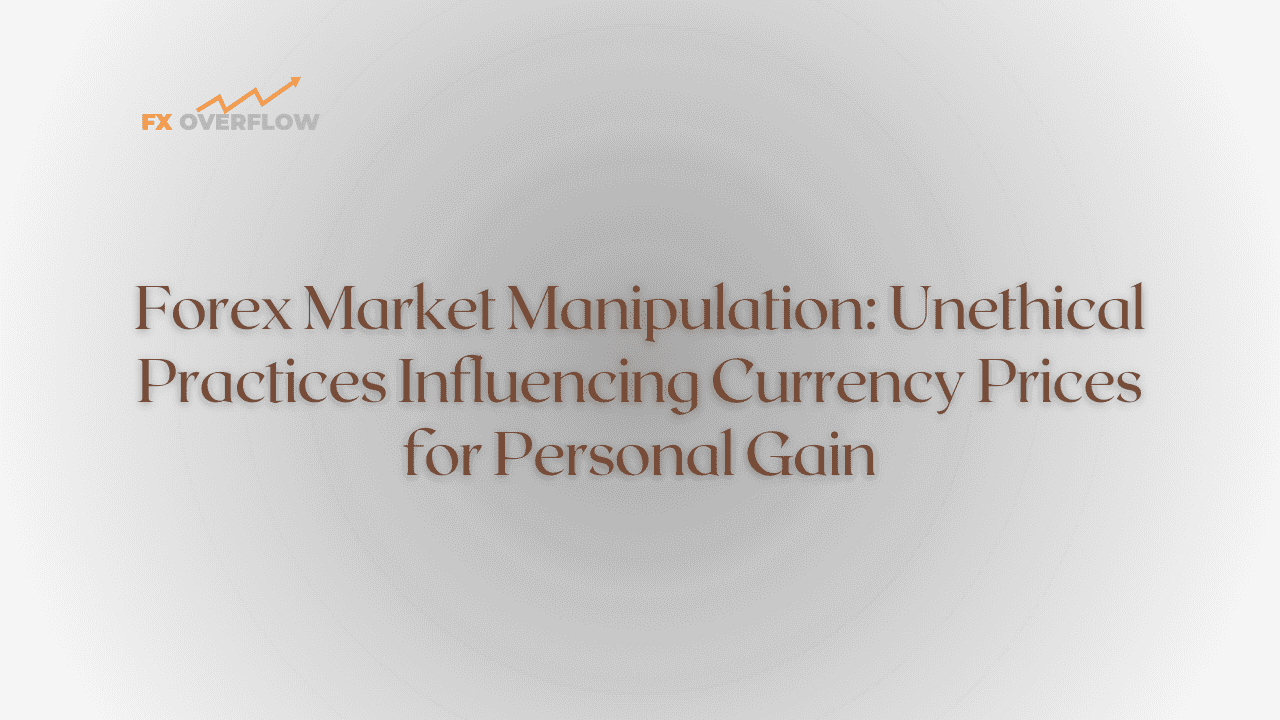Forex Market Manipulation: Unethical Practices Influencing Currency Prices for Personal Gain
Welcome to an in-depth exploration of Forex market manipulation, a critical issue that affects the global financial landscape. In this comprehensive article, we'll delve into the world of unethical practices that unscrupulous individuals employ to influence currency prices for their personal gain. Understanding these manipulations is vital for traders, investors, and anyone involved in the foreign exchange market. So, let's uncover the techniques, reasons, and potential consequences of Forex market manipulation.
Table Content
1. Forex Market Manipulation: Understanding the Basics
2. What is Forex Market Manipulation?
3. The Lure of Personal Gain
4. Common Unethical Practices in Forex Market Manipulation
5. Consequences of Forex Market Manipulation
6. Protecting Yourself from Forex Market Manipulation
7. FAQs (Frequently Asked Questions)
8. Footnote
Forex Market Manipulation: Understanding the Basics
Before we delve into the unethical practices, let's first establish a solid understanding of the Forex market and how it operates.

The foreign exchange market, or Forex, is a decentralized marketplace where currencies are bought and sold. It's the largest and most liquid financial market globally, with trillions of dollars traded daily. Major participants include central banks, financial institutions, corporations, governments, and retail investors.
What is Forex Market Manipulation?
Forex market manipulation involves intentional actions aimed at influencing currency prices to create an advantage for certain individuals or entities. These manipulations can distort the natural supply and demand dynamics, leading to false perceptions of market conditions.
The Lure of Personal Gain
Forex market manipulation is driven by the lure of personal gain. Individuals or groups with substantial financial resources seek to profit by manipulating currency prices in their favor. Such unethical practices erode market fairness and integrity, negatively impacting legitimate traders and investors.
Common Unethical Practices in Forex Market Manipulation
Now that we have a foundational understanding, let's explore some common unethical practices employed by manipulators:
1. Spoofing and Layering
Spoofing and layering involve placing large buy or sell orders with no intention of executing them. The aim is to create artificial buying or selling pressure, influencing other traders' decisions.
2. Pump and Dump
In the Forex market, pump and dump schemes involve artificially inflating the value of a currency through false positive rumors or misleading information. Once the price rises, manipulators sell their positions for a significant profit, leaving other traders at a loss.
3. Front Running
Front running occurs when a manipulator executes trades based on non-public information before a large order from a client. This allows them to profit from the subsequent price
movement.
4. Wash Trading
Wash trading involves a manipulator simultaneously buying and selling the same currency to create the illusion of high trading activity. This practice can deceive others into believing there is genuine market interest.
5. Central Bank Interventions
Central banks can manipulate currency prices by buying or selling large amounts of a currency in the market. This action can impact supply and demand dynamics, leading to currency value fluctuations.
6. Time Zone Manipulation
Forex markets operate 24/5, spanning different time zones. Manipulators may exploit low liquidity periods to push currency prices in their desired direction.
Consequences of Forex Market Manipulation
Forex market manipulation can have far-reaching consequences, both for individual traders and the broader financial system:
1. Loss of Trader Confidence
Manipulative practices erode trader confidence in the market's fairness and transparency, leading to reluctance to participate.
2. Increased Market Volatility
Unethical practices can create artificial market volatility, making it challenging to identify genuine trends.
3. Regulatory Scrutiny
Authorities worldwide are increasingly cracking down on market manipulation, leading to strict regulatory actions and penalties.
4. Economic Impact
Large-scale manipulations can impact a country's economy, affecting trade balances and overall financial stability.
5. Losses for Retail Traders
Retail traders with limited resources are particularly vulnerable to manipulative activities, often resulting in significant losses.
Protecting Yourself from Forex Market Manipulation
While traders cannot entirely eliminate the risk of manipulation, they can take measures to protect themselves:
1. Stay Informed
Keep abreast of market news, trends, and events that may affect currency prices.
2. Use Multiple Indicators
Rely on a variety of technical and fundamental indicators to verify price movements.
3. Diversify Your Portfolio
Spreading investments across different currencies can mitigate the impact of manipulation on a single position.
4. Choose Reputable Brokers
Work with reputable and regulated brokers to reduce the risk of fraudulent activities.
5. Report Suspicious Activities
If you encounter suspicious market behavior, report it to the appropriate authorities.
FAQs (Frequently Asked Questions)
Q: How prevalent is Forex market manipulation?
A: While difficult to quantify precisely, instances of market manipulation have been reported across various currencies and timeframes.
Q: Can central banks legally manipulate the Forex market?
A: Central banks may intervene in the Forex market to stabilize their national currency, but excessive or secretive interventions can be viewed as manipulation.
Q: Is Forex market manipulation punishable by law?
A: Yes, in many jurisdictions, market manipulation is a criminal offense and subject to severe penalties.
Q: Can retail traders engage in Forex market manipulation?
A: Retail traders do not possess the resources or influence to engage in large-scale manipulations seen in institutional settings.
Q: How can traders identify potential market manipulations?
A: Unusual price spikes, suspicious order patterns, and unusual trading volumes are red flags that may indicate market manipulation.
Q: Are cryptocurrencies immune to market manipulation?
A: No, cryptocurrencies are not immune, and they have experienced instances of manipulation as well.
Footnote
In Summary, Forex market manipulation remains a concerning issue that demands ongoing attention from regulators, market participants, and investors alike. By understanding the common manipulative practices and taking proactive measures, traders can safeguard their interests in this dynamic market. A transparent and ethical Forex market benefits everyone involved and fosters a healthier financial ecosystem for the future.











Discussion